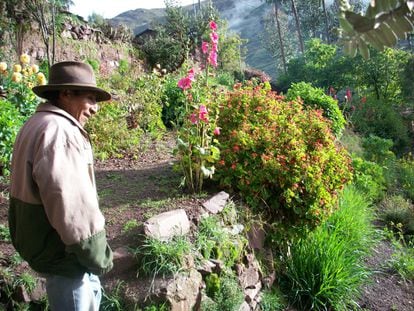Organic garden in Paras, Peru.Gabriel Pons Cortès
While I am digging the tomato plants in my almost organic garden, I listen to the radio.
They talk about an agroecological project in Cameroon, in which a promoter says that due to the use of chemical fertilizers, in three years the production decreases, instead of increasing.
This is probably false, and it is surely due to poor agronomic management, for which fertilizers are not to blame.
But the announcer comments enthusiastically, perhaps thinking that they have found the solution to world hunger: not using chemical fertilizers.
Agriculture shares with education the dubious honor of being a field of knowledge where everyone feels empowered to give their opinion, regardless of whether the closest agronomic experience was going to buy at the ecological cooperative on the corner.
For this reason, a few months ago I decided to try to explain why agroecology (the science, movement and practice of applying ecological processes in agricultural, livestock and forestry production systems) is not a solution to the problems of the food system in this video.
There are deep-rooted ideas about agriculture with regard to improving food systems.
The first impression is the one that counts, and from there we fall into the confirmation bias, paying attention only to the information that reaffirms our previous ideas.
As Sánchez Ferlosio said, no one ever convinces anyone of anything.
An advisor tells me: “Never mind, tell them stories!
Stories are more convincing than data.”
My rationalistic soul shudders for trying to convince by sentimental means instead of using data, but he tells me that don't worry, the important thing is to convince someone.
So, persevering in my vocational determination to undermine my employability by creating controversies, I proceed to try to convince that this agroecology offers less than it promises, but by telling stories.
We need a system capable of feeding 9.5 billion people in 2050. We cannot promote false solutions based on aesthetic and romantic ideas
My prevention on agroecology comes from a long time ago.
In Nicaragua, in 2005, I visited a peasant leader with 20 hectares of rice fields.
I asked if he used compost.
He told me no, that he couldn't get the necessary amount for such an extension and that he didn't have enough mechanization to distribute it.
He used chemical fertilizer, but the projects of his organization promoted organic fertilizer for the poorest.
In 2008, I visited an indigenous couple in Guatemala who produced corn, barely enough to survive.
They had been supported for years by a project to apply agroecology.
They had stopped resorting to chemical fertilizers to start paying only with organic, so their yields had dropped.
His statements saddened me: "Now we eat less, but we are happy because we no longer poison the earth."
I thought, but didn't say: Poison the earth?
Who told them that they poison her?
Why couldn't they buy more fertilizer if they didn't use more than 10 kilos of fertilizer per hectare?
Another day, still in Guatemala, I went to see a coffee producer on a farm in the mountains.
He produced less since he only used compost, because since he could only access it by donkey, he could not carry the same amount of fertilizer (compost is much bulkier).
Compost has between 10 and 50 times less nitrogen concentration than urea, a
chemical
fertilizer , which implies a need to use larger quantities, and therefore make many more trips.
In Burkina Faso, West Africa, agroecological projects also target small producers.
In the north of this country, in 2012 I saw how they used a small pit to compost, with a completely insufficient organic fertilizer production, which was not enough to compensate for the loss of nutrients that the soil has suffered for decades.
Few projects made calculations on the balance of nutrients resulting from the use of organic fertilizers.
In my 30 years of working in cooperation I have never come across a project that analyzes the changes in the soil as a result of the new practices introduced.
So, when in 2008 I proposed a study to measure the effects of an agroecological project in Paraguay, the results did not surprise me: the organic fertilizer did not have the necessary concentration of nutrients to ensure the maintenance of soil fertility.
With the use of chemical fertilizers, the extractions of phosphorus and potassium in the fields were around between 38 and 180 kilos per year, while the contribution of both nutrients through organic fertilizer was between 1.8 and 2.5 kilos per year. , respectively.
The study did produce some unexpected results: the researchers were declared persona non grata by the Paraguayan organization, which also requested my dismissal for having promoted the investigation (request ignored, to my personal relief).
In my 30 years of working in cooperation I have never come across a project that analyzes the changes in the soil as a result of the new practices introduced
In the absence of numbers, we rely on aesthetics, and that loses us, because seeing a landscape of terraced rice fields we do not think of the inhuman work that it represents: preparing the land, planting and harvesting on a slope.
We only see a beautiful landscape and infer that those who live there are happy.
Those who work on terraces do so because they do not have access to flat, arable land with machinery, which they would surely prefer, even if they did not appear in the photos of good practices later.
We show photos of happy women with hoes, without thinking that they will remain poor until they change them for a tractor.
They have the same right as anyone not to break the bank with work, but mechanization is not among the strategies most promoted by NGOs.
The predominant vision of happy arcadia shows us that agroecology is far from achieving the food justice that some defend.
Agroecology has triumphed, and we have to thank it for that, by showing the contradictions of a food system that is too dependent on fossil fuels, which are real and serious, but without offering viable solutions in practice.
We need a system capable of feeding 9.5 billion people in 2050. We cannot promote false solutions based on aesthetic and romantic ideas.
On the road to hell, paved with good intentions, organic lettuce grows between the slabs.
Gabriel Pons Cortès
is an expert in rural development and promoter of Estatera.
You can follow PLANETA FUTURO on
,
and
, and subscribe
to our 'newsletter'
here
.












/cloudfront-eu-central-1.images.arcpublishing.com/prisa/KMEYMJKESBAZBE4MRBAM4TGHIQ.jpg)


